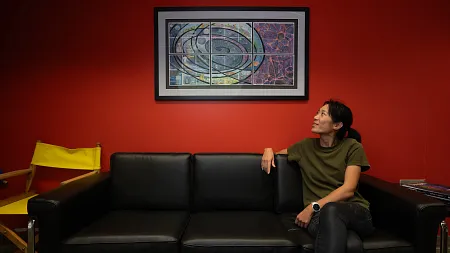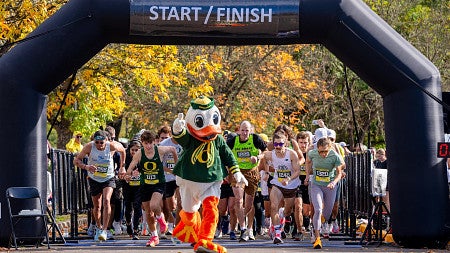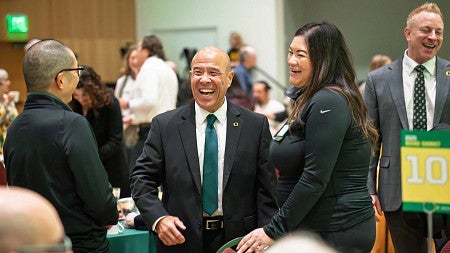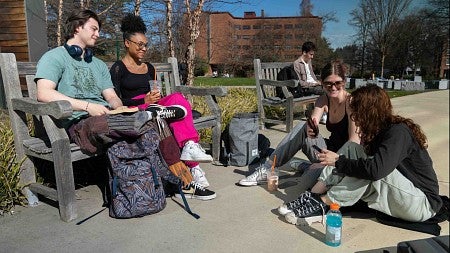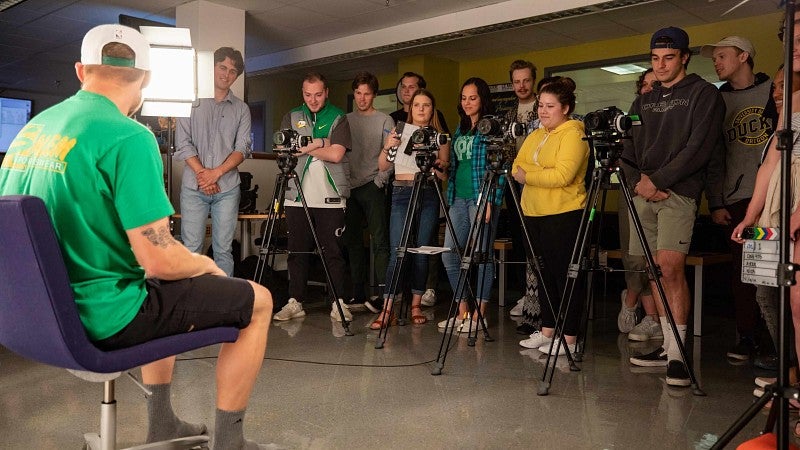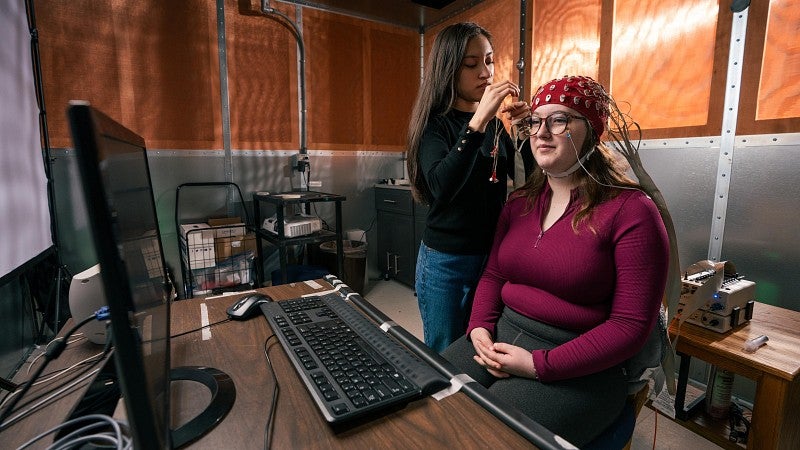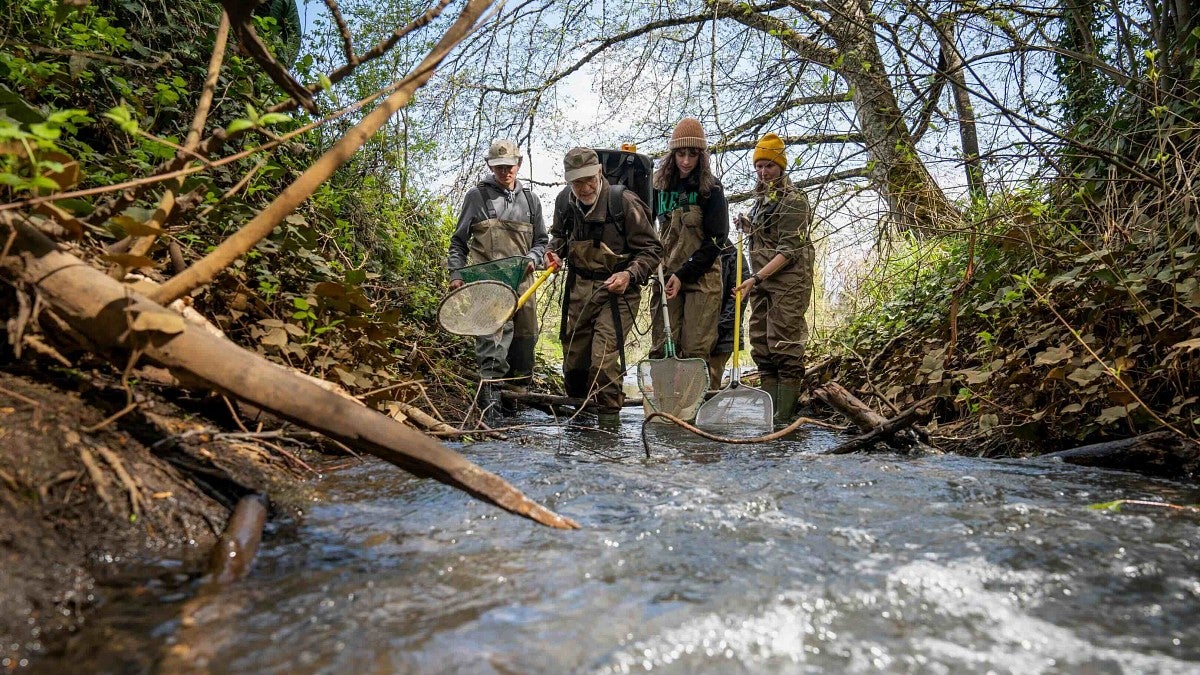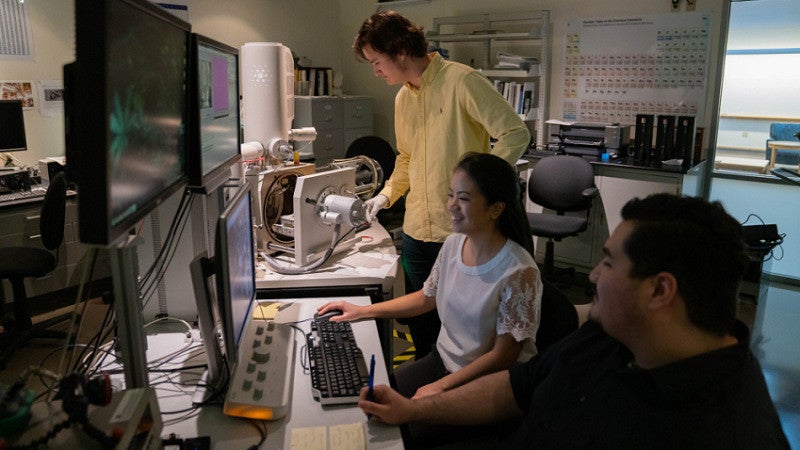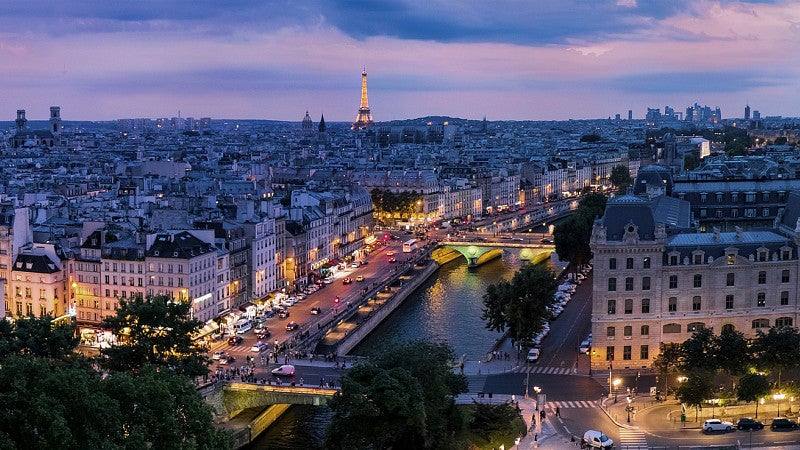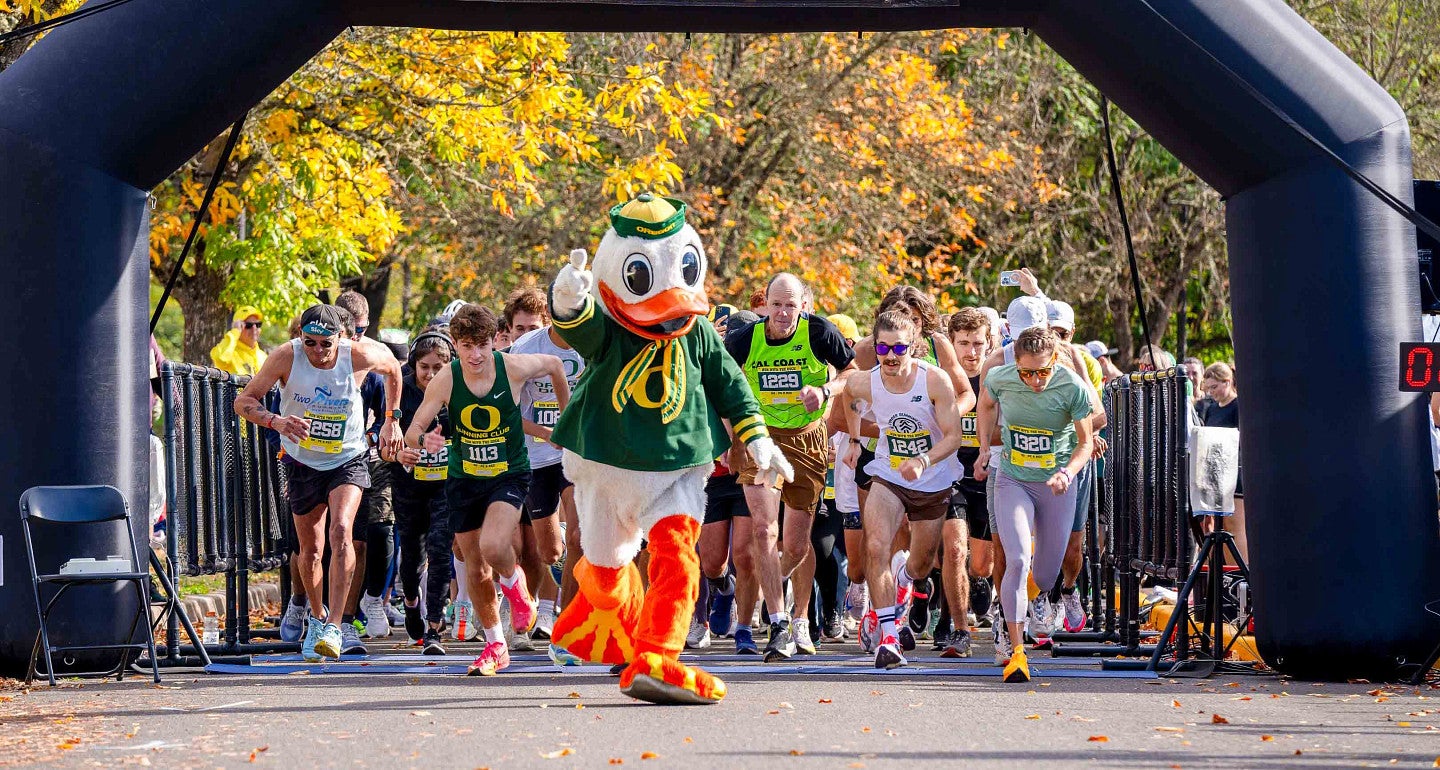
The Science Behind Goals
New Year's Resolutions are out. Making goals that resonate with your true desires are in.
But have you struggled with sticking to your goals, whether you're working on personal achievements, coursework as a student, or just everyday work life? Find out what research says about goal setting, and how celebrating the small steps can lead to big change.
“With goals, we want to want them. We have been given a sense of what we should do or what we should want to accomplish, but if we don’t have that desire in our heart of hearts, it will be very difficult to change our behavior,” according to Elliot Berkman, College of Arts and Sciences (CAS) psychology professor and divisional associate dean, Natural Sciences.
Read more about what's happening in the College of Arts and Sciences in the January issue of CAS Connection.
News from CAS
All news »
We Love Our Supporters
Gifts to the College of Arts and Sciences can help our students make the most of their college careers. To do this, CAS needs your support. Your contributions help us ensure that teaching, research, advising, mentoring, and support services are fully available to every student. Thank you!
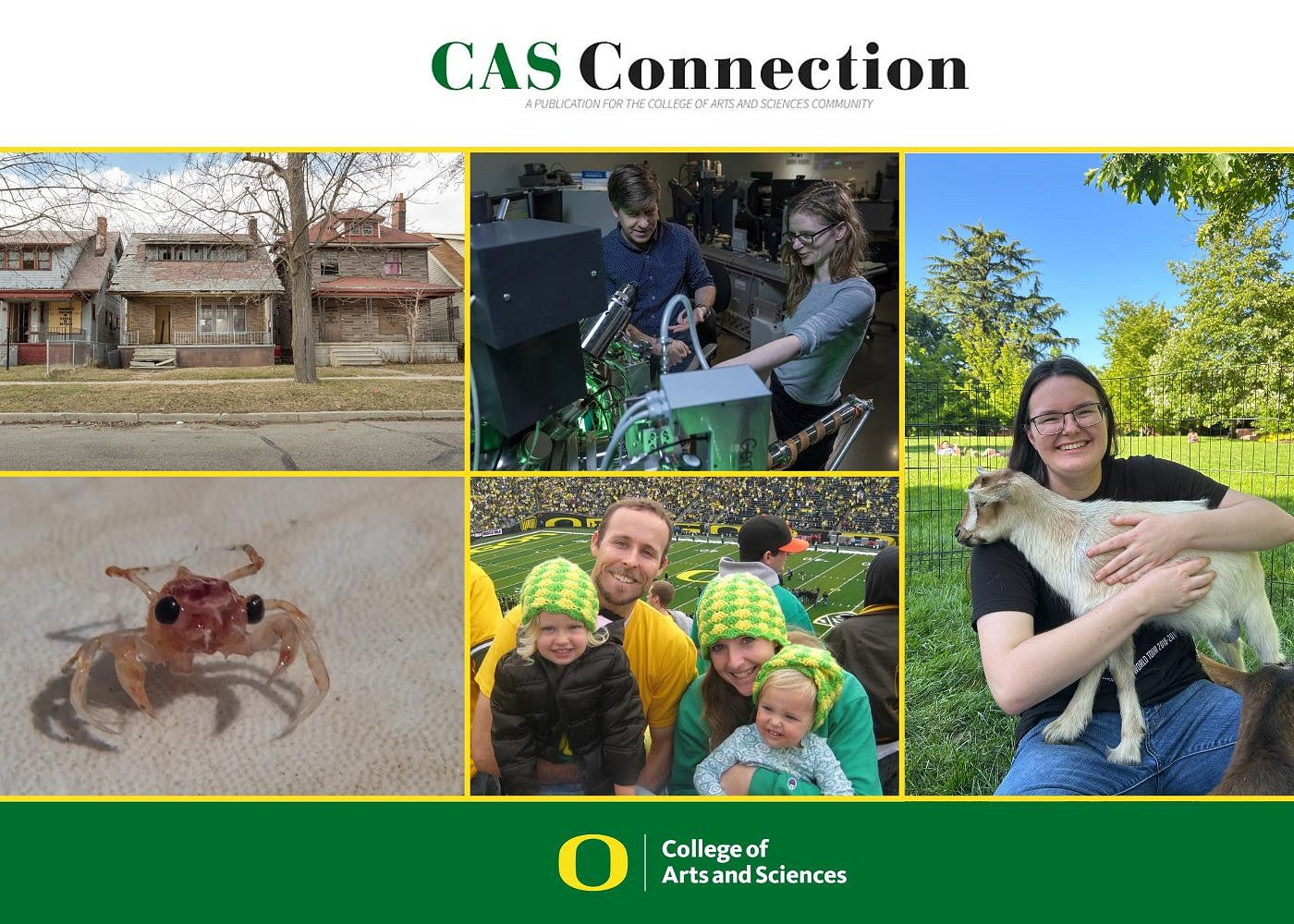
What’s Happening in CAS?
How can you rethink goals, whether it's for personal achievement, success in the classroom or in everyday work life? CAS Psychology Professor and Natural Sciences Divisional Associate Dean Elliot Berkman offers a way to rethink the "why" behind your goals.
Also in the January CAS Connection issue, find out what new CAS major is equipping students to drive change, how squatting in three US cities influenced housing policies, an alum who leveraged his Spanish degree to. U.S. Department of State job—and more.
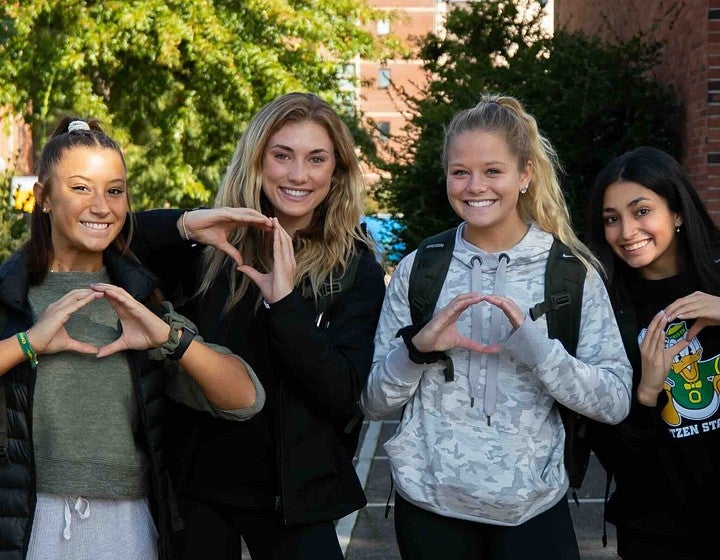
Undergraduate Studies
Wherever your academic goals eventually take you at the UO, all Ducks begin their journey with foundational courses in CAS. More than 60 percent of students go on to pursue a major in a CAS department or program. With more than 50 departments and programs, there’s an intellectual home for almost any interest, talent, or career aspiration.
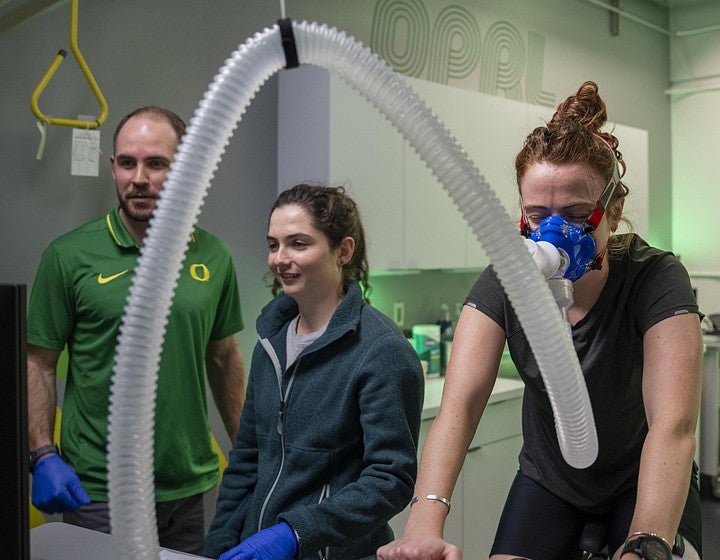
Graduate Studies
The College of Arts and Sciences offers more than 30 master's programs and more than 20 doctoral programs across a diverse range of disciplines. Both as contributors to research teams and through their own scholarship and teaching, our CAS graduate students are indispensable to the vitality of the UO academic mission.
Student Support Services
We provide our students with a variety of resources to help you thrive inside and outside the classroom. Through Tykeson Advising, we provide comprehensive academic and career advising from the start of your journey at the University of Oregon. Learn about career preparation and get assistance in selecting the very best classes. Connect with labs, libraries, IT and tutoring. Find your community on campus.
World-Class Faculty
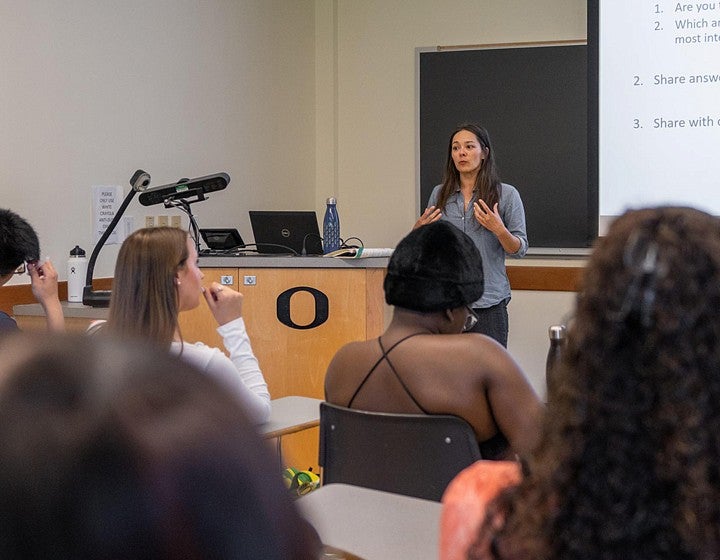
The College of Arts and Sciences faculty members are a driving force of the high-output, high-impact research activity that has earned the UO membership in the prestigious Association of American Universities (AAU). Our world-class faculty members are inspiring teachers.
Among them are five members of the American Academy of Arts and Sciences, four members of the National Academy of Sciences. They are committed to helping students discover their academic passion. Every day, they work to expand students’ intellectual horizons, preparing them for life after college with real-world knowledge and skills.
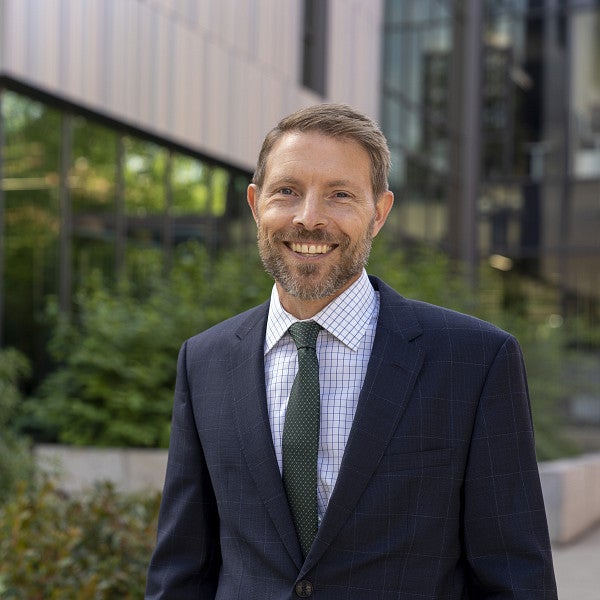
Meet our Dean
In the College of Arts and Sciences (CAS), we are committed to excellence in research and teaching, student success, and diversity, equity, and belonging.
A liberal arts education—one that offers a breadth of intellectual approaches and perspectives and depth in a major discipline—is the foundation to a purposeful life as a life-long learner, engaged citizen, and leader. The skills you will learn here—from written and verbal communication to analytical and quantitative reasoning, to compassion and understanding—are those that employers seek and will open the door to a wealth of opportunities.
You will find more than 50 majors and a multitude of minors within CAS, and seemingly endless opportunities for personal exploration and discovery. Whether you are an incoming first-year student, a grad student or a transfer student, you can map an exciting future and be part of a fun, warm, engaged liberal arts community here. Come join us. And go Ducks!
The College of Arts and Sciences includes:
Happening at CAS
Find daily ways to engage your career curiosity with workshops, local industry tours, alumni panels & networking events, the Winter Career & Internship Expo (1/29), and Practice Interview Day (1/30) that will help you develop skills and connections on the road to career readiness. For a full list of workshops, career tours, networking events, resume reviews, alumni panels, and more, visit career.uoregon.edu/events or register for events in Handshake. Why wait?! Stop by the University Career Center in Tykeson Hall-Garden Level ASAP to get drop-in resume reviews and other career guidance to make the most of your Career Readiness Week!
The University Career Center offers a special thanks to our Winter 2026 Career Readiness Week sponsor: Enterprise Mobility!
Resume Extravaganza Wednesday, January 21st, 11am-4pm, Tykeson Hall Commons (1st Floor) Did you know you can have someone review your resume before the Winter Career & Internship Expo? Drop in anytime to get feedback on your resume. Don’t have a resume? Come learn how to make one!
Portland Internship Experience Virtual Info Session Thursday, January 22nd, 3pm-4pm, Zoom (register via Handshake) Interested in learning more about PIE? Get an overview of the program including the application process, curriculum and expectations, resources/support available throughout the summer, and insights from last year's program.
Career Tour: Life Sciences & Beyond! Friday, January 23rd, 9am-1:30pm, meet at Ford Alumni Center Want to see what it's like to work in a state-of-the-art laboratory, do scientific research, project management, or even scientific communication. Tour Stops include: Thermo Fisher Scientific, Yogi Tea, & InVivo Biosystems. Lunch included!
Curious about the Career & Internship Expo (Virtual Info Session) Monday, January 26th, 12pm-1pm via Zoom (Register in Handshake) Learn the ins and outs of navigating the in-person Winter Career & Internship Expo, updating your Handshake profile, researching employers, and how to present yourself authentically during the expo.
How To: Interview Strategies (Workshop) Monday, January 26th, 2pm-2:45pm, Tykeson Hall Garden Level 50P (University Career Center-Conference Room) We’ll break down the different types of interviews you might face, how to prep without spiraling, and how to answer questions with confidence.
How To: Resume Writing (Workshop) Tuesday, January 27th, 1pm-1:45pm, Tykeson Hall Garden Level 50P (University Career Center-Conference Room) We’ll cover what actually matters on a resume and how to make your experience shine! Plus, we’ll break down how AI plays a role in the job application process. Leave with tips to make your resume clean, strong, and job ready!
How To: Cover Letters (Workshop) Tuesday, January 27th, 3pm-3:45pm, Tykeson Hall Garden Level 50P (University Career Center-Conference Room) We’ll show you what a cover letter really needs. Plus, we’ll dive into how AI is changing the application game and what that means for personalizing your letter. Leave with tips to make yours clear, compelling, and unmistakably you.
Your Future in Communication (Panel + Networking) Tuesday, January 27th, 4pm-6pm, Tykeson Hall 1st Floor Commons 4-5pm: Industry Insights Panel: Hear stories and ask questions of industry leaders who have excelled in their careers as communications professionals. From backgrounds and experiences in advertising, public relations, journalism, and more! Learn about the skills and connections you can develop today to thrive in the future.
5-6pm: Connect with Employers & Alumni: Grab a snack and rotate through casual small group chats with alumni, professionals, and employers to learn more about their companies, career paths, and get advice about how to find career-building opportunities and connections for your future in the field of Communication.
GitHub Portfolios for Job Seekers (Workshop) Wednesday, January 28th, 4pm-6pm, Knight Library-Dream Lab (122) Learn how to create a free digital portfolio on GitHub to highlight your coding and career readiness skills for future employers & open-source projects.
Biz Careers: Marketing, Sales, Operations & Analytics (Panel + Networking) Wednesday, January 29th, 5:30pm-6:30pm Alumni Panel in Lillis 182 + 6:30-8pm Networking Mixer in Lillis Atrium Learn from alumni about career paths and what skills and experience you can gain now to be a competitive applicant. Immediately after the panel discussion, expand your network of employer connections and learn about immediate opportunities for internships and full-time jobs.
Winter Expo Preview & Tour Thursday, January 29th, 11:15am-12pm, EMU Ballrooms/Maple First Career & Internship Expo? Or just a little nervous? Come early and get a low-stress, behind-the-scenes look at how to navigate the expo and make a good first impression with employers.
Winter Career & Internship Expo Thursday, January 29th, 12pm-4pm, EMU Ballrooms Get curious about your future and make connections with cool employers! Over 50+ businesses, non-profits, and government agencies are on campus and excited to share more with you about their organization and early career talent opportunities—especially internships and summer jobs! Take part in the Expo Scavenger Hunt to win prizes and have fun conversation starters with employers. Want to make a great first impression? Bring copies of your resume and wear an outfit that reflects your confidence, personality, and professionalism.
School of Architecture & Environment Career & Networking Fair Thursday, January 29th, 11am-3pm, Lawrence Hall Meet firms in person! Bring your portfolio, be ready to schedule an informational or internship interview. Perhaps you are seeking a job! Meet and talk to firms to establish when they might be hiring. Build your professional network. These firms are ready to mentor and offer internships and job opportunities!
Winter Practice Interview Day (Drop-Ins Welcome!) Friday, January 30th, 12pm-4pm (30-45 minutes each), Tykeson Hall 1st Floor Commons Come practice commonly asked interview questions and get active feedback on your communication style, interviewing skills, professionalism, and more. Get feedback from experienced professionals and career coaches.
Portland Internship Experience Virtual Info Session Friday, January 30th, 3pm-4pm, Zoom (register via Handshake) Interested in learning more about PIE? Get an overview of the program including the application process, curriculum and expectations, resources/support available throughout the summer, and insights from last year's program.
10:00–11:00 a.m.
Please join us Tuesday mornings for a free cup of coffee, pastries, and conversation with your history department community! We’re excited to continue this tradition for our history undergraduate and graduate students, faculty, and staff. We hope to see you there!
noon
Are you a graduate student doing research on Latinx or Latin American topics? Consider joining the Center for Latino/a and Latin American Studies for a brief info session about our Graduate Student Research Grant! Attendees will learn about the application process and receive tips for writing a competitive proposal. Each grant awards up to $3,000, and four grants are available.
**Vegan champurrado will be served!**
Learn more about the CLLAS Student Research Grant: https://cllas.uoregon.edu/jan-27-cllas-graduate-grants-info-session/
4:00–6:00 p.m.
Join Global Education Oregon for an information session on our summer 2026 Cinema Studies in Dublin program! This summer program is a fantastic opportunity to work both critically and creatively, taking courses on contemporary Irish cinema and digital filmmaking, as well as attending Ireland’s largest film festival held every year in Galway, the Film Fleadh. Weekly excursions and local outings in and around Dublin and the Irish countryside allow you to learn on location about the country’s rich film history and explore the sites where important historical events, and films about those events, took place.
This program has received high interest, and students are encouraged to apply early. The Cinema Studies in Dublin program is on a rolling admission application process, and the final deadline to apply in March 15.

